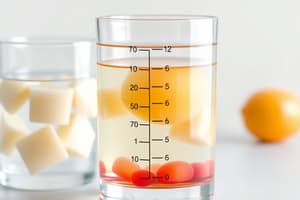Podcast
Questions and Answers
What are the consequences of disturbances in fluid and electrolyte balance in the body?
What are the consequences of disturbances in fluid and electrolyte balance in the body?
Disturbances can disrupt cell function, cause cell injury, affect blood volume, and potentially lead to life-threatening conditions.
Describe the role of renal, hormonal, and neural functions in maintaining electrolyte balance.
Describe the role of renal, hormonal, and neural functions in maintaining electrolyte balance.
These systems work together to regulate the concentrations of electrolytes and maintain homeostasis in the body.
How does the composition of electrolytes impact the electrical potentials of excitatory cells?
How does the composition of electrolytes impact the electrical potentials of excitatory cells?
Changes in electrolyte composition can alter the electrical charge across cell membranes, affecting excitability and function.
What is the total body water (TBW) percentage of a 70-kg adult male?
What is the total body water (TBW) percentage of a 70-kg adult male?
Explain how water moves between the body's compartments.
Explain how water moves between the body's compartments.
Identify the primary sources of body water.
Identify the primary sources of body water.
What are the two main extracellular fluid (ECF) compartments?
What are the two main extracellular fluid (ECF) compartments?
How does the body primarily regulate water volume?
How does the body primarily regulate water volume?
How do alterations in pH affect cellular functions?
How do alterations in pH affect cellular functions?
What role do osmotic and hydrostatic forces play in fluid distribution?
What role do osmotic and hydrostatic forces play in fluid distribution?
What is the significance of the interstitial fluid in the extracellular fluid compartments?
What is the significance of the interstitial fluid in the extracellular fluid compartments?
How does fluid fluctuation impact blood pressure?
How does fluid fluctuation impact blood pressure?
Why is total body water expressed as a percentage of body weight?
Why is total body water expressed as a percentage of body weight?
What is the primary source of water loss in the body?
What is the primary source of water loss in the body?
What are the components of total body water (TBW)?
What are the components of total body water (TBW)?
How do renal, hormonal, and neural functions integrate to maintain electrolyte balance?
How do renal, hormonal, and neural functions integrate to maintain electrolyte balance?
What percentage of body weight is typically occupied by water in a 70-kg male?
What percentage of body weight is typically occupied by water in a 70-kg male?
What types of fluids can be considered part of the transcellular compartment?
What types of fluids can be considered part of the transcellular compartment?
Flashcards are hidden until you start studying
Study Notes
Fluid and Electrolyte Balance
- Body cells require stable electrolyte and acid-base concentrations for optimal function.
- Renal, hormonal, and neural systems work together to maintain this balance.
- Electrolyte changes can influence electrical potentials in cells, altering fluid shifts and cell functions.
Impact of Fluid Fluctuations
- Fluid changes can affect blood volume and blood pressure.
- pH alterations can disrupt enzyme systems, leading to cellular injury.
- Disturbances in fluid or electrolyte balance can be life-threatening, necessitating understanding of body compensation mechanisms.
Body Water Distribution
- Body fluids are divided into functional compartments, crucial for cellular and tissue processes.
- Water distribution occurs via osmotic and hydrostatic forces.
- Two-thirds of body water is intracellular fluid (ICF), while one-third is extracellular fluid (ECF).
Extracellular Fluid Compartments
- Major ECF compartments include interstitial fluid and intravascular fluid (blood plasma).
- Other ECF compartments are lymph, saliva, and various transcellular fluids (e.g., cerebrospinal, synovial, and pericardial fluids).
- The total body water (TBW) comprises all body fluid compartments.
Total Body Water (TBW)
- TBW volume is typically expressed as a percentage of body weight.
- Standard TBW is about 60% of the weight of a 70 kg male, equating to 42 liters.
- Remainder of body weight consists of fat and fat-free solids like bone.
Water Regulation
- Daily fluid intake varies, but the body maintains water volume within narrow limits.
- Primary water sources are drinking, food, and oxidative metabolism.
- Largest fluid losses occur through renal excretion, with smaller losses via stool and insensible water loss (skin and lungs).
Solute and Water Exchange
- Despite consistent fluid volumes, solute and water exchanges maintain compartment compositions.
- Percentage of TBW varies based on body fat and age; higher fat percentage correlates with decreased hydration.
- Individuals with more body fat have less TBW, increasing susceptibility to dehydration.
Fluid and Electrolyte Balance
- Body cells require stable electrolyte and acid-base concentrations for optimal function.
- Renal, hormonal, and neural systems work together to maintain this balance.
- Electrolyte changes can influence electrical potentials in cells, altering fluid shifts and cell functions.
Impact of Fluid Fluctuations
- Fluid changes can affect blood volume and blood pressure.
- pH alterations can disrupt enzyme systems, leading to cellular injury.
- Disturbances in fluid or electrolyte balance can be life-threatening, necessitating understanding of body compensation mechanisms.
Body Water Distribution
- Body fluids are divided into functional compartments, crucial for cellular and tissue processes.
- Water distribution occurs via osmotic and hydrostatic forces.
- Two-thirds of body water is intracellular fluid (ICF), while one-third is extracellular fluid (ECF).
Extracellular Fluid Compartments
- Major ECF compartments include interstitial fluid and intravascular fluid (blood plasma).
- Other ECF compartments are lymph, saliva, and various transcellular fluids (e.g., cerebrospinal, synovial, and pericardial fluids).
- The total body water (TBW) comprises all body fluid compartments.
Total Body Water (TBW)
- TBW volume is typically expressed as a percentage of body weight.
- Standard TBW is about 60% of the weight of a 70 kg male, equating to 42 liters.
- Remainder of body weight consists of fat and fat-free solids like bone.
Water Regulation
- Daily fluid intake varies, but the body maintains water volume within narrow limits.
- Primary water sources are drinking, food, and oxidative metabolism.
- Largest fluid losses occur through renal excretion, with smaller losses via stool and insensible water loss (skin and lungs).
Solute and Water Exchange
- Despite consistent fluid volumes, solute and water exchanges maintain compartment compositions.
- Percentage of TBW varies based on body fat and age; higher fat percentage correlates with decreased hydration.
- Individuals with more body fat have less TBW, increasing susceptibility to dehydration.
Studying That Suits You
Use AI to generate personalized quizzes and flashcards to suit your learning preferences.




